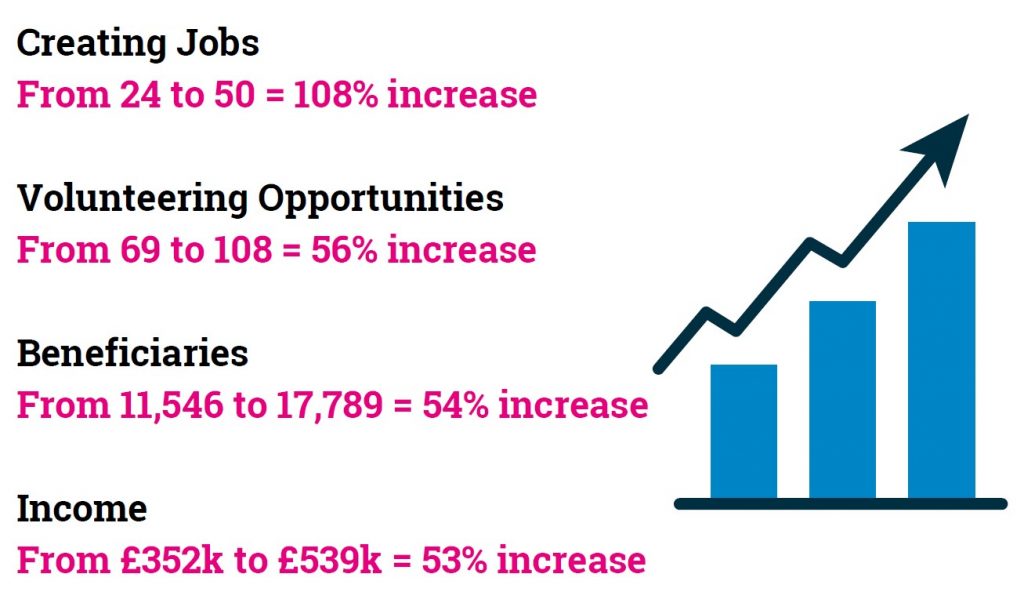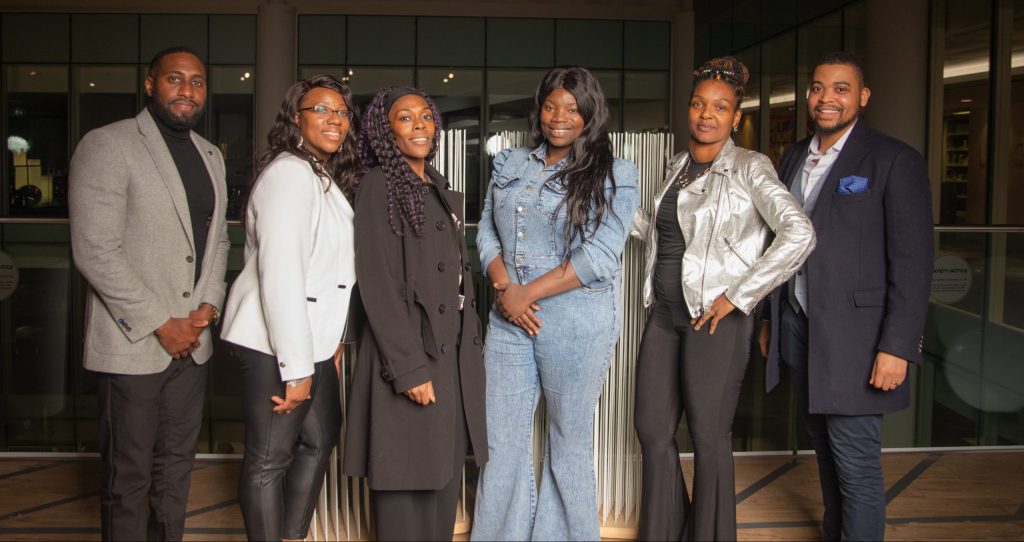Update on our anti-racist commitments (April 2022)
28 Apr 2022
In January 2021, we set out SSE’s commitments to become an anti-racist organisation. Commitments are nothing without action and accountability. So twice a year, we’ll update you on the progress we’re making. Our last update was in October 2021.
Read our progress, from December 2022
We invite you to challenge us and push for progress, if you think we could be doing more to become truly inclusive and equitable.
A word from Ali Wilson, our CEO:
“I’m proud to see that our anti-racist efforts have resulted in us supporting a higher proportion of Black social entrepreneurs and changemakers, as well as those from mixed and multiple ethnic backgrounds.
“We have not made as much internal progress as we would have liked in the past six months. This is due to structural changes and staff changes at SSE, as well as launching our new organisational strategy, all of which have consumed resource and focus.
“We are still wholeheartedly committed to becoming an anti-racist organisation. We will apply ourselves with renewed vigour in the months ahead.
“Our three-year Diversity, Equity & Inclusion action plan will be published soon. This lays out SSE’s approach to addressing racism – and other intersecting forms of systemic oppression and injustice – between now and 2025.
“We look forward to sharing this with you and taking further action to become truly anti-racist.”
1. Keep learning and challenging ourselves to be anti-racist
Our commitment: We will analyse, reflect, learn and challenge ourselves, and our community, to be anti-racist – now and on an ongoing basis.
Measuring progress
Indicator 1: Action plan for 20/21 developed collaboratively, and implemented
- We completed our three-year Diversity, Equity & Inclusion (DEI) action plan last year, incorporating our anti-racist commitments.
- We are currently realigning this plan with our new organisational strategy, and will publish a summary on our website soon.
- In line with the plan, we ran a session with our board of trustees in March to explore this question: What kind of culture do you need as a board to support the work of Diversity, Equity and Inclusion?
Indicator 2: Actions and target outcomes published as part of new three-year strategy
- DEI (Diversity, equity and inclusion) is one of the seven pillars of development underpinning our new organisational strategy.
- We have agreed DEI priorities for 2022-23.
- We have not developed target outcomes specifically on anti-racism within the strategy, but we will ensure DEI goals are embedded as we move into operational planning.

The impact created by students of our first Black Social Entrepreneurs Futures Programme, supported by Gowling WLG – more info below.
2. Diversify our staff team, senior leadership, and board
Our commitment: We will increase the representation of people from Black and other racialised and minoritised communities* in our staff team, particularly at senior level and among the trustee board. We will publicly set and report on diversity indicators.
Measuring progress
Indicator 3: Diversity of staff team, including at senior level
- We restructured in December 2021 and have not monitored the ethnic and racial diversity of the team since then. We aim to report on this data in our next update.
- We acknowledge that there are no people from racialised and minoritised communities* in our senior management team.
- We piloted the use of Applied: recruitment software that aims to remove systemic biases from hiring processes. We are now assessing whether to adopt this as standard.
- In the meantime, we are reviewing job applications by anonymising applications and responses to questions, to try to remove unconscious bias in the hiring process.
Indicator 4: Diversity of our trustee board
- Our trustee board is:
- 50% white English
- 25% Black and/or Black-British Caribbean
- 5% mixed ethnic background
- 5% white – other
- Please note the make-up of our board has not changed since our October 2021 update, so this data is the same as reported then.
3. Diversify our programmes (people and content)
We will increase the racial and ethnic diversity of participants on our programmes at all stages, from pre-start to scale, as well as provide targeted programmes of support for people from Black and other racialised and minoritised communities. We will make our programmes more inclusive to achieve this, in particular by improving our recruitment and selection processes and by diversifying our delivery team (e.g. assessors, speakers and facilitators).
Measuring progress
Indicator 5: Diversity of student population
- Since January 2021, we have increased the proportion of Black students we support (from 11% to 15%).
- The proportion of Black students enrolled on our programmes is the same as the proportion who applied.
- We have also increased the proportion of students we support from mixed/multiple ethnic backgrounds (2% to 5%).
- Other racialised and minoritised groups have stayed consistent, other than a slight drop in white British students (from 63% to 57%).
Indicator 6: Diversity of entrepreneurship delivery team (assessors, speakers, facilitators)
- We have not yet established systems to assess the diversity of our freelancers and external contributors, due to an operational focus on our restructure.
- We hope to commence this work in the year ahead.
Indicator 7: At least two targeted programmes for people from racialised and minoritised backgrounds established by end of the financial year
- Last year we established programmes specifically for Black social entrepreneurs. One was the Black Social Entrepreneurs Futures in the Midlands, supported by Gowling WLG. Take a look at the programme year book to learn more about the students and their organisations.
- We also established and delivered the first PwC Black Social Entrepreneurs Programme. Thanks to support from PwC, we are proud to be running the PwC Black Social Entrepreneurs Programme again this year.
- In addition, we’ll be running a new PwC Black Social Entrepreneurs Start Up Programme in Scotland this year.
Learn more: Reflections on SSE’s first Black Social Entrepreneurs Futures Programme

Indicator 8: Multi-stakeholder learning captured, shared internally and externally, and used to inform future action
- We share learning with our wider sector through articles about our learning, and by engaging with DEI forums.
- For example, we participate at different levels with the Diversity Forum, which strives to create a more diverse social sector. Our head of communications Sophie is on the steering group, and our communications coordinator Henna is in the champions network.
- Our Global Majority Collective contributed a reflective piece to our annual report 2020-21 (p.14).
4. Influence our supply chain and funders
We will increase diversity in our supply chain and promote and influence funder action on anti-racism, through who we work with and how we engage. This means working with funders and supporters who are willing to work alongside us to continue to learn and develop their practice to be anti-racist.
Measuring progress
Indicator 9: Increase in the number and value of supplier contracts held by people from Black and other racialised and minoritised communities in our supply chain
- We don’t capture this data yet. Staff changes have meant we haven’t had the capacity to progress the work as quickly as we’d like.
- We aim to begin this work in the year ahead.
Indicator 10: Existing funder/supporter commitment to anti-racism assessed and a framework agreed for facilitating meaningful and collaborative discussions to inform decision making regarding future opportunities
- Currently there is a lack of baseline for this indicator. By June this year, we are aiming for our development team to:
-
- develop a policy commitment to how we are choosing to work with funders and partners
- establish a framework to help us to gain a baseline
- In addition, narrative and budget for new projects will show our commitment to inclusion:
-
- we will complete narrative to be included in all bids and proposals
- budgets will be developed to include a specific line for inclusion
What’s next?
We’ll continue to update on our commitments twice a year, typically in October and April.
(*We know that language about identity is personal and these terms won’t feel right to everyone. We mean people who may identify as Black, Brown, bi- or multi-racial, being from a diaspora, having Asian/African/Caribbean/Latinx/Middle Eastern/Indigenous heritage, as a “person of colour”, Jewish, and/or from a white ethnic minority such as Gypsy, Roma, Traveller. We have consulted our community to shape this language.)
